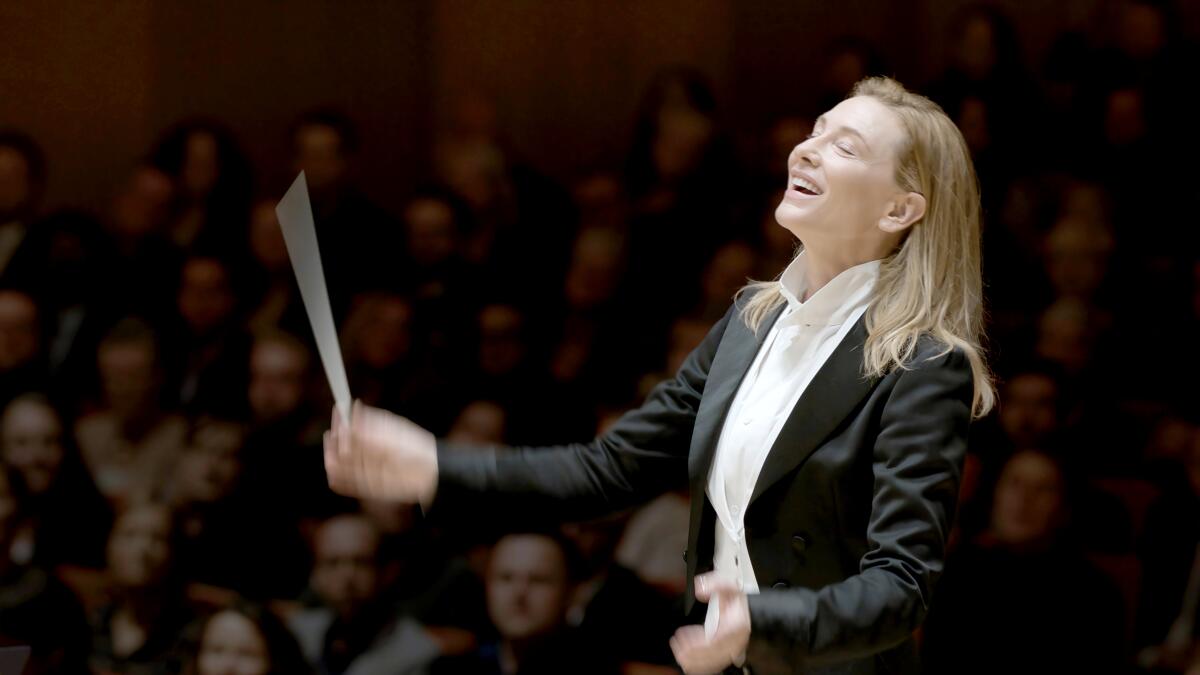How sound pushed the story of ‘Tár’s’ conductor into psychological territory

- Share via
Following a 16-year absence from filmmaking, Oscar-nominated writer-director Todd Field (“In the Bedroom,” “Little Children”), returns with “Tár,” an incisive character study of genius and arrogance. As Lydia Tár, world renowned conductor-composer and foremost interpreter of Mahler, Cate Blanchett is widely thought to be the front-runner for the lead actress Oscar. Look to the film’s sound department as an essential force in illustrating her character’s journey. More than most, Tár experiences the world through sound. But as her behavior becomes more erratic, she begins to question whether she can trust her ears.
“The nuance of being a conductor, the small subtleties of performance within the orchestra that she has to be aware of and control and examine, they’re sort of tenuous details,” supervising sound editor Stephen Griffiths says. “Those moments when she starts questioning, the facade is starting to crack, it’s all through her psychological perception of the world around her.”
That world includes a metronome in the living room that wakes her in the middle of the night, and a hum from the refrigerator that sends her searching through the dark for its source.
Cate Blanchett, director Todd Field and composer Hildur Guðnadóttir break down the vital role classical music plays in the critically hailed ‘Tár.’
“She has misphonia, which means she’s very sensitive to certain sounds,” says re-recording mixer Deb Adair, who worked principally with dialogue and music tracks. “Todd and I played around with those scenes a lot. So, where is this sound coming from? Is it real? Is it just in her head? Is she just being hypersensitive? It kind of moves around. The audience doesn’t really know where it’s coming from.”
Also elusive is Oscar-winning composer Hildur Guðnadóttir’s score, which is designed to have an almost subliminal impact. “Hildur’s music, it’s all about mounting dread,” notes Griffiths. “Todd wanted you to feel it but almost not hear it.”
Much of the film is centered on rehearsals for a live recording of Mahler’s Fifth Symphony and Elgar’s Cello Concerto by a major Berlin symphony orchestra where Tár is the first female conductor. In the Trauermarsch, the symphony’s first movement, the magnitude of the full orchestra is palpable. Sound mixer Roland Winke individually miked the instruments and used a Decca tree, an array of omnidirectional microphones, to capture the full ensemble, leaving the sound team more than 50 tracks to work with.
For a key scene captured in a single take between Tár and a student in a lecture hall, Winke miked the actors and hid a microphone in the piano. In post, they eliminated body rustles and dips when voices go slightly off-mic.
“She’s just amazing,” Griffiths says of Blanchett in the scene. “She can be funny, witty, intelligent and then get to the piano and do a pastiche of Glenn Gould and actually play the music in three different styles. It says everything about her in that scene. It shows her brilliance and also her Achilles’ heel, the fact that she humiliated a student, the worst thing any teacher can ever do. She just can’t stop herself.”
Other challenges included the echoing Brutalist concrete walls in Tár’s home, as well as the floors in the apartment she uses as a workspace. “It has to be the creakiest floorboards in Christendom,” laughs Griffiths.
The mix and edit took place at London’s famed Abbey Road Studios, a familiar location to UK-based Griffiths, but a rare treat for Adair, who’s from L.A. “I had to pinch myself every single day walking through those doors,” she says, noting that she didn’t get a picture of herself on the crosswalk made famous by the Beatles because her English crew sneered at the tourists lined up there for selfies.
“Someone’s going to get run over,” says Griffiths. “It would be quite embarrassing if it was one of us. It’s so crowded on the crossing there are literally queues of people waiting to go.”
Adair has been working in the industry for over 30 years on such titles as “Bridgerton” and its new spinoff, “Queen Charlotte,” as well as Bennett Miller movies “Foxcatcher’’ and “Moneyball,” for which she received an Oscar nomination. But Griffiths, a BAFTA Award winner, has never been nominated.
“If it were to happen, I would be very lucky, and it would be fantastic,” he brightens, then frowns. “But usually it’s the big sound movies that get the chance. A win for this, that would be marvelous.”
More to Read
From the Oscars to the Emmys.
Get the Envelope newsletter for exclusive awards season coverage, behind-the-scenes stories from the Envelope podcast and columnist Glenn Whipp’s must-read analysis.
You may occasionally receive promotional content from the Los Angeles Times.











